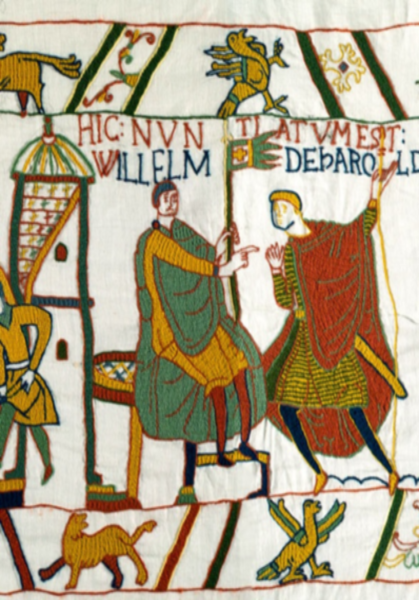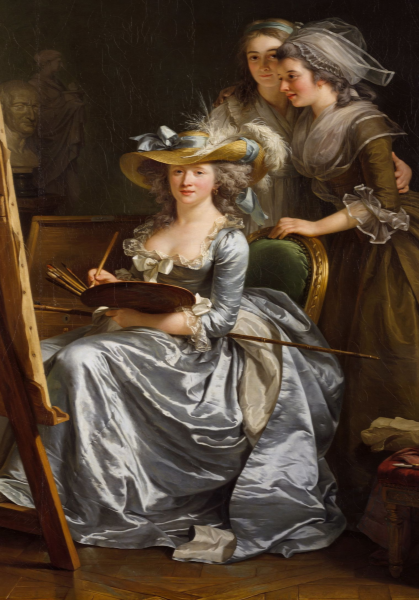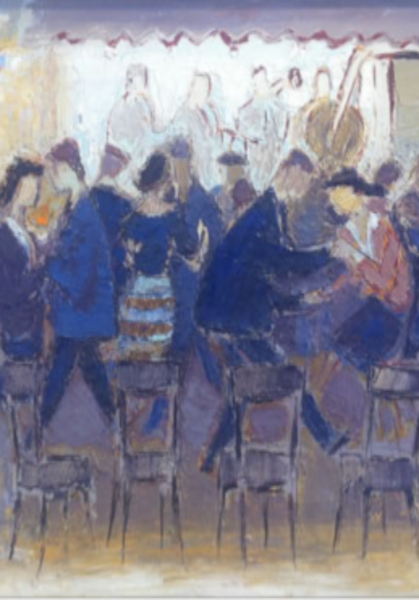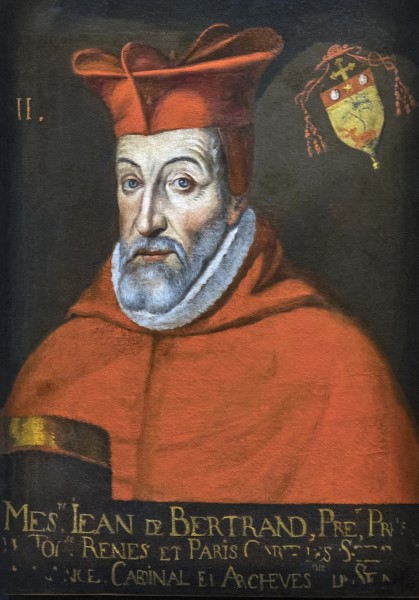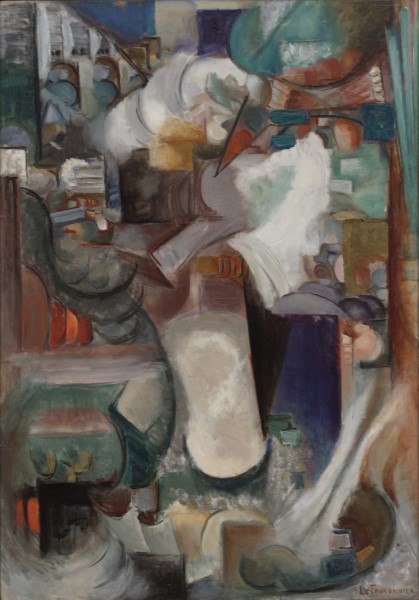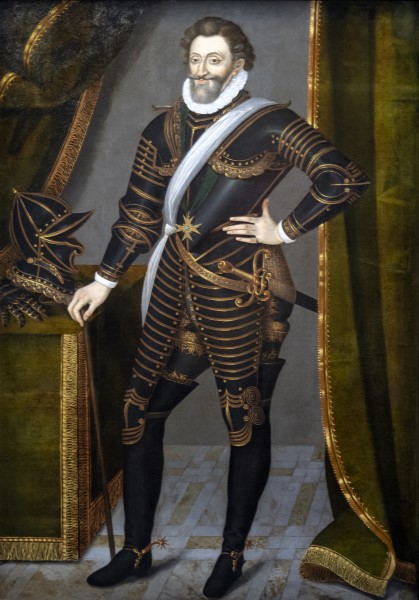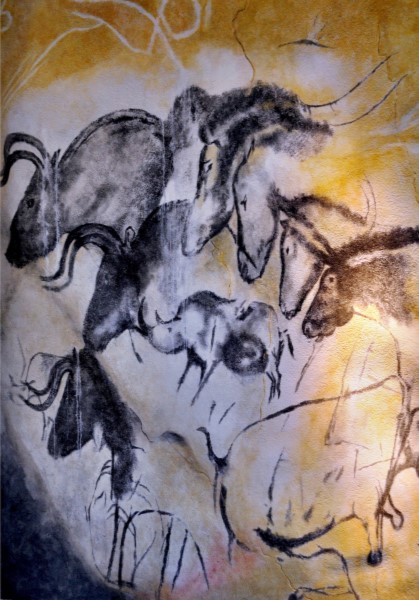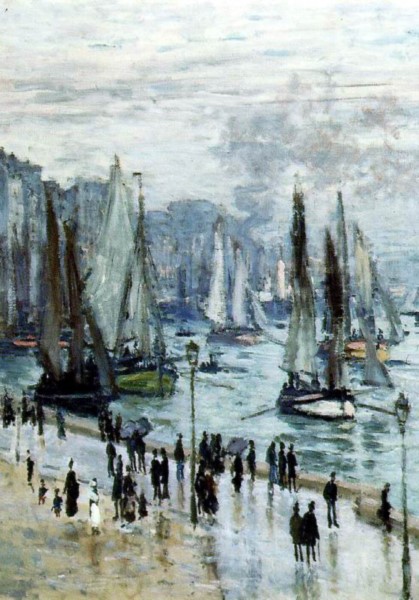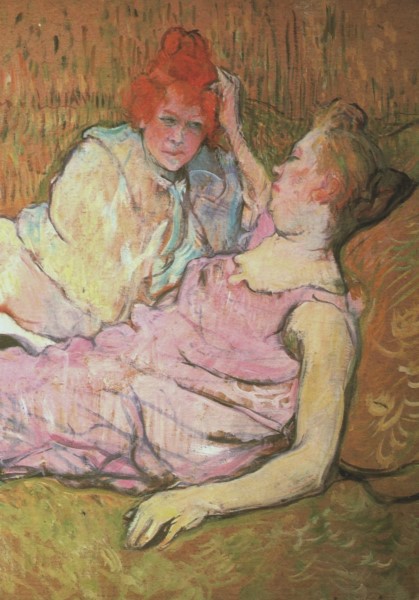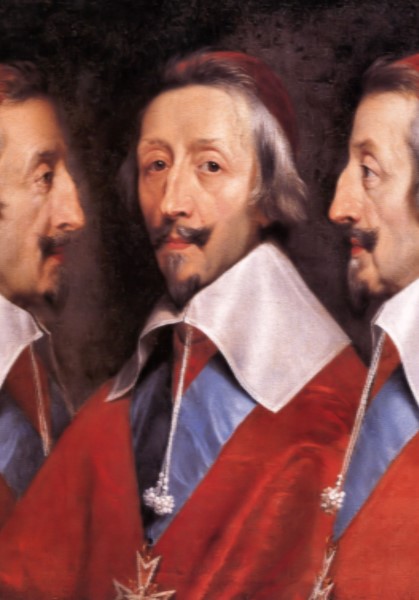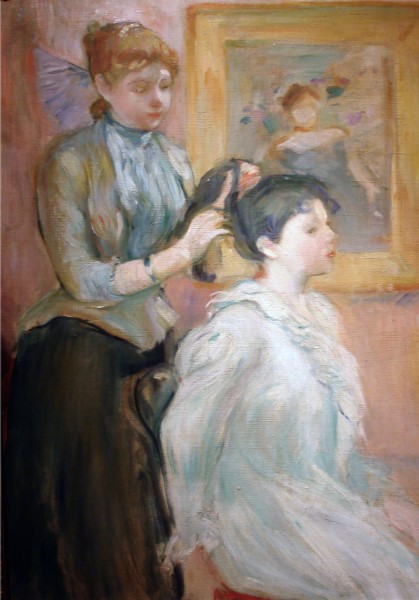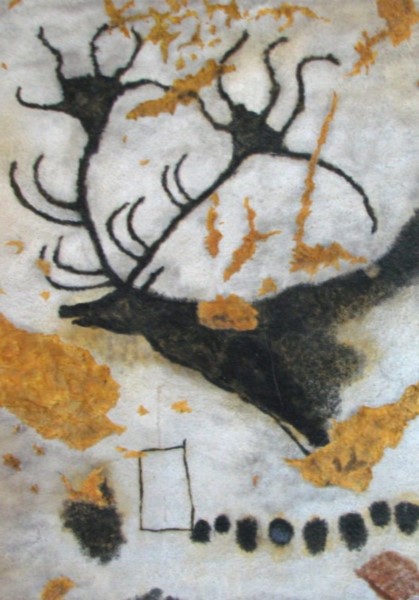Volume 11, Issues 16-21
“What the Revolution Means Today”
I am delighted to introduce a series of exchanges around what the French Revolution means today. This series, spearheaded by Marisa Linton, commemorates the 230th anniversary of the Revolution, but also intends to inspire reflection on what the Revolution may continue to mean for us as scholars, teachers, and citizens.
Five of these interwoven strands follow (released as individual issues), each with contributions from four or five scholars. The first, “Rethinking the French Revolutionary Terror,” edited by Marisa Linton, challenges some of our pervasive assumptions as scholars and teachers of the Revolution. Contributors to this strand question whether it is useful to talk about the Terror as a coherent and capitalized event, and consider what violence and trauma meant at other moments of the Revolution.
Volume 11, Issue 16
“Rethinking the French Revolutionary Terror”
Edited by Marisa Linton, Kingston University
“Introduction”
Marisa Linton
Kingston University
“Remplacer la Terreur par la « terreur » pour mieux comprendre l’une et l’autre ?”
Michel Biard
GRHis, Université de Rouen Normandie
“Terror and the Revolutionary Tribunals”
Carla Hesse
University of California, Berkeley
“Habitual Terror and the Legislative Body in the Revolution”
Mette Harder
SUNY Oneonta
“The Terror as a Difficult Past”
Ronen Steinberg
Michigan State University
In “The Revolution Abroad,” edited by Annie Jourdan, several scholars reflect on their own experiences researching and teaching the Revolution from outside France, including from the United States, Germany, the Netherlands, and Italy. They also consider how different national agendas and institutional contexts have shaped how—and how much—the French Revolution is regarded today.
Volume 11, Issue 17
“The Revolution Abroad”
Edited by Annie Jourdan, University of Amsterdam
“Introduction”
Annie Jourdan
University of Amsterdam
“The French Revolution: One American Historian’s View”
Rafe Blaufarb
Florida State University
“The French Revolution Abroad: Le cas italien”
Paolo Conte
Università della Basilicata
“The French Revolution Abroad: The Netherlands”
Matthijs Lok
University of Amsterdam
“Quoi de neuf à l’Est ? La Révolution française et l’Allemagne”
Anna Karla
Universität zu Köln
“Revisiting French Revolutionary Culture,” edited by Sophie Matthiesson, turns our attention to material culture and consumption. Contributors ask us to think not only about the importance of objects and archives, but also to reflect on how choices made by collectors and curators have influenced the basis of what we know about, and how we understand, the Revolution.
Volume 11, Issue 18
“Revisiting French Revolutionary Culture”
Edited by Sophie Matthiesson, National Gallery of Victoria, Melbourne
“Introduction”
Sophie Matthiesson
National Gallery of Victoria, Melbourne
“The Emotive Artifacts of the French Revolution”
Philippe Bordes
Université Lumière-Lyon 2
“Against Ephemera”
Richard Taws
University College London
“Transmitting the French Revolution: A Compulsive History”
Tom Stammers
Durham University
A fourth strand, “Whose Rights? The French Revolution and the Present,” edited by Ian Coller, addresses what it means to engage with the history of the Revolution in our contemporary political and cultural world, from wrestling with questions of global history and activism in the classroom to the resonances of the MeToo movement and the rights of “living beings” writ large.
Volume 11, Issue 19
“Whose Rights? The French Revolution and the Present”
Edited by Ian Coller, University of California, Irvine
“Introduction: Whose Rights? The French Revolution and the Present”
Ian Coller
University of California, Irvine
“The French Revolution, #MeToo, and Embodying Rights”
Mita Choudhury
Vassar College
“Whose Revolution? Rights and the French Revolution Today: A Perspective from the Classroom”
Pernille Røge
University of Pittsburgh
“La révolution des droits des êtres vivants 1789-1802”
Pierre Serna
Université Paris 1 – Panthéon-Sorbonne, Institut Universitaire de France
The last strand, “The French Revolution Beyond the Academy,” edited by Guillaume Mazeau, looks more closely at the continued powerful—if also sometimes problematic—presence of the Revolution in a myriad of contexts, from classroom games to political interventions to contemporary film.
Volume 11, Issue 20
“The French Revolution Beyond the Academy”
Edited by Guillaume Mazeau, Université Paris-1 Panthéon Sorbonne (Centre d’histoire du XIXe siècle) et Institut d’histoire du Temps Présent
“Joyeux non-anniversaire, or the French Revolution reloaded. Rouvrir une histoire fatiguée”
Guillaume Mazeau
Université Paris-1 Panthéon Sorbonne (Centre d’histoire du XIXe siècle) et Institut d’histoire du Temps Présent
“The Revolution and Me”
Jennifer Popiel
Saint Louis University
“Memory Avatars and Augmented Historical Reality: The French Revolution through its Commercial Spin-Offs”
Martial Poirson
Université Paris 8
“Ecrire des chroniques dans un journal, en historienne de la Révolution française, un enjeu épistémologique et politique”
Sophie Wahnich
CNRS, Paris, IIAC-EHESS
IAS, Member of Social Sciences School, 2018-2019
“Convoquer la Révolution française interpelle un état politique dans lequel on est aujourd’hui”
Entretien avec Pierre Schoeller, réalisateur cinéaste
Guillaume Mazeau
Université Paris-1 Panthéon Sorbonne (Centre d’histoire du XIXe siècle) et Institut d’histoire du Temps Présent
We conclude with a videoed exchange between Lynn Hunt and Peter McPhee reflecting on the ideas and questions raised in these various strands.
Volume 11, Issue 21
Discussion: “230 years after: what does the French Revolution mean today?: Reflections”
Discussants:
Peter McPhee, University of Melbourne
Lynn Hunt, University of California, Los Angeles
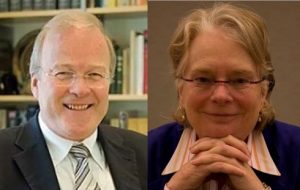
Video available HERE
Overall, this series of salons was intended to include as diverse a range of voices as possible. We sought to bring together both relatively new scholars and well established people, Francophone and Anglophone scholars, and those from various parts of the world (including France, the United States, the UK, Australia, the Netherlands, Germany, and Italy.) There are many other people whose voices could—and should—have been part of this; we very much hope that this will spark continued conversations and exchanges!
Jennifer Heuer
University of Massachusetts-Amherst
Volume 11, Issue 15
“Natalie Zemon Davis: A Celebration of Her 90th Birthday”
Edited by:
Angela N. H. Creager, Princeton University
Francesca Trivellato, Institute for Advanced Study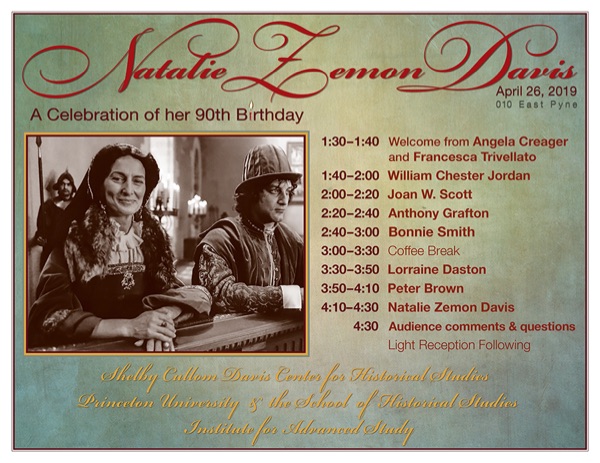 On April 26, 2019, Princeton University’s Shelby Cullom Davis Center for Historical Studies and the School of Historical Studies at the Institute for Advanced Study joined forces to celebrate the 90th birthday of Natalie Zemon Davis. Five former colleagues and friends paid tribute to Davis’s brilliant scholarship and intellectual leadership, then Davis herself regaled us with an account of her collaboration with the Lebanese-French-Québécois playwright and director Wajdi Mouawad, which brought an adaptation of her book Trickster Travels: A Sixteenth-Century Muslim Between Worlds to the stage. It was a dazzling event in a packed auditorium. We are delighted that the speakers, themselves illustrious historians, agreed to have their texts published on H-France Salon.
On April 26, 2019, Princeton University’s Shelby Cullom Davis Center for Historical Studies and the School of Historical Studies at the Institute for Advanced Study joined forces to celebrate the 90th birthday of Natalie Zemon Davis. Five former colleagues and friends paid tribute to Davis’s brilliant scholarship and intellectual leadership, then Davis herself regaled us with an account of her collaboration with the Lebanese-French-Québécois playwright and director Wajdi Mouawad, which brought an adaptation of her book Trickster Travels: A Sixteenth-Century Muslim Between Worlds to the stage. It was a dazzling event in a packed auditorium. We are delighted that the speakers, themselves illustrious historians, agreed to have their texts published on H-France Salon.
“Introduction”
Angela N. H Creager (Princeton University) and Francesca Trivellato (Institute for Advanced Study)
“A Microhistory of an Unnamed French Girl, 1267”
William Chester Jordan
Princeton University
“Natalie Zemon Davis, Historian of Hope”
Joan Wallach Scott
Institute for Advanced Study
“A Present for Natalie”
Anthony T. Grafton
Princeton University
“Natalie Zemon Davis Solves a Problem”
Bonnie G. Smith
Rutgers, The State University of New Jersey
“Classic Natalie”
Lorraine Daston
Max Planck Institute for the History of Science/University of Chicago
“Listening with Natalie, 1975”
Peter Brown
Princeton University
“Doing History at 90”
Natalie Zemon Davis
Princeton University
Volume 11, Issue 14
“Legitimizing ‘iel’? Language and Trans Communities in Francophone and Anglophone Spaces”
Edited by:
Vinay Swamy, Vassar College
Louisa Mackenzie, University of Washington, Seattle
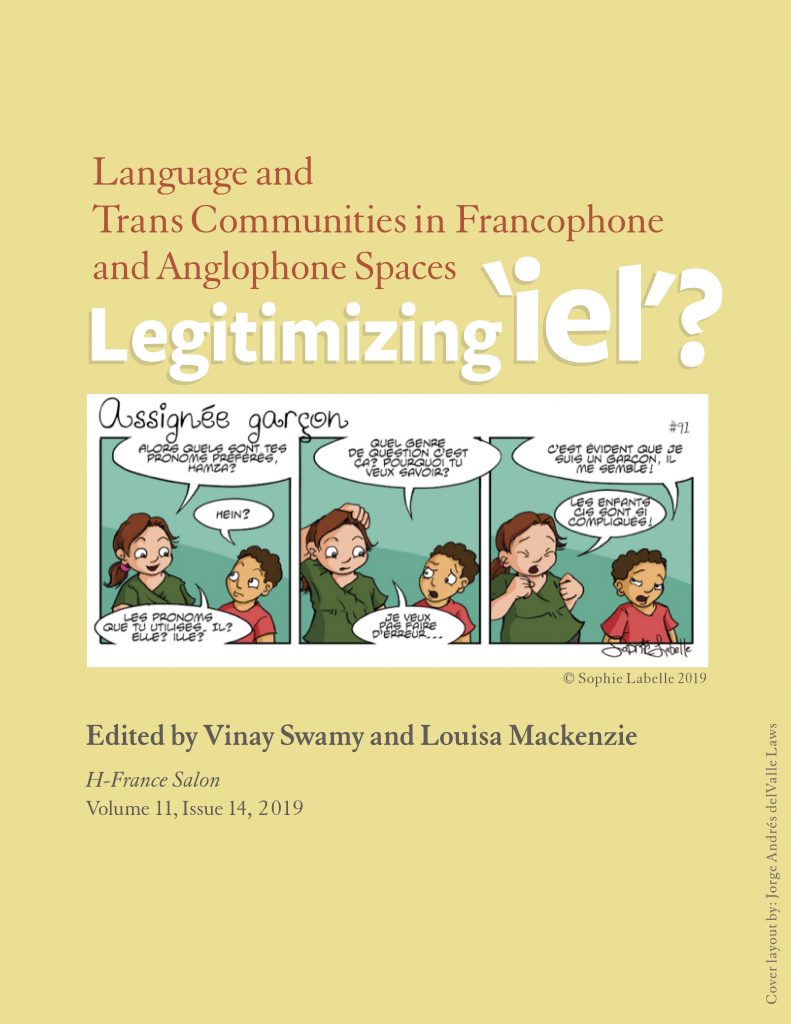 The last few years have seen an increased visibility of non-binary persons who are publicly claiming their identities and pronouns beyond the gender binary in both English and French. While the singular “they” has gained favor among many in Anglophone spaces due in part to the precedent for such a usage in English, Francophone non-binary persons have had to face further challenges regarding language and syntax given the binary nature of French grammar itself. This special issue considers recent attempts to make available gender‑equitable, ‑neutral, and ‑expansive language and identities to French speakers within linguistic, cultural, and pedagogical spaces. In offering to the readers of H-France our reflections on these developments, the contributors to this special issue expand on the fruitful exchange initiated at a symposium at Vassar College in April 2018—when earlier versions of this material were first presented—and invite dialogue with a broader public. In so doing, we hope that the questions we raise will be taken in the spirit of ongoing inquiry rather than as prescriptive positions (as indicated by the titular question mark), and that our chapters will be read as open-ended engagements with the rapidly-developing public conversations on non-binary issues beyond the academy. We also hope that the embedded hyperlinks and the appended glossary will allow our readers to engage directly, if they so wish, with the many multimedial resources cited in this issue.
The last few years have seen an increased visibility of non-binary persons who are publicly claiming their identities and pronouns beyond the gender binary in both English and French. While the singular “they” has gained favor among many in Anglophone spaces due in part to the precedent for such a usage in English, Francophone non-binary persons have had to face further challenges regarding language and syntax given the binary nature of French grammar itself. This special issue considers recent attempts to make available gender‑equitable, ‑neutral, and ‑expansive language and identities to French speakers within linguistic, cultural, and pedagogical spaces. In offering to the readers of H-France our reflections on these developments, the contributors to this special issue expand on the fruitful exchange initiated at a symposium at Vassar College in April 2018—when earlier versions of this material were first presented—and invite dialogue with a broader public. In so doing, we hope that the questions we raise will be taken in the spirit of ongoing inquiry rather than as prescriptive positions (as indicated by the titular question mark), and that our chapters will be read as open-ended engagements with the rapidly-developing public conversations on non-binary issues beyond the academy. We also hope that the embedded hyperlinks and the appended glossary will allow our readers to engage directly, if they so wish, with the many multimedial resources cited in this issue.
“Introduction”
Vinay Swamy (Vassar College) and Louisa Mackenzie (University of Washington, Seattle)
I. Histories
“« Le masculin l’emporte » : évolution des stratégies linguistiques dans les associations LGBT+ en France”
Flora Bolter
Fondation Jean Jaurès
“Linguistic Uprisings: Toward a Grammar of Emancipation”
Luca Greco
Université de Metz
II. Pedagogies
“‘Faut-il choisir ?’: Transgender Access to the French Language Classroom”
Blase A. Provitola
Columbia University
“Les personnes non-binaires en français : une perspective concernée et militante”
Florence Ashley
McGill University
III. Art, Activism, Academia
“Transnational Reflections on Embodying Non-binary Pronouns”
Logan Natalie O’Laughlin
Duke University
“Beyond ‘French-American’ Binary Thinking on Non-Binary Gender”
Louisa Mackenzie
University of Washington, Seattle
“Assignée garçon or Grappling with the Trans Question in the French Language”
Vinay Swamy
Vassar College
Volume 11, Issue 13
H-France Webinar: “Democratic Problems in the Age of Revolution”
April 12, 2019
Hosted by Camille Robcis, Columbia University
Guest Participants:

Sophia Rosenfeld, University of Pennsylvania
Stephen Sawyer, The American University in Paris
Dan Edelstein, Stanford University
Video available HERE
Volume 11, Issue 12
H-France Webinar: “Memory in Post-War France”
October 26, 2018
Hosted by Camille Robcis, Columbia University
Guest Participants:
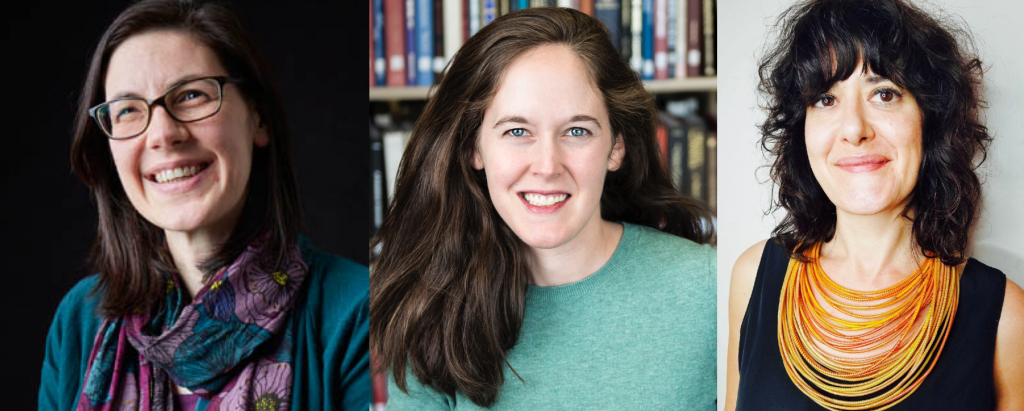
Claire Eldridge, University of Leeds
Emma Kuby, Northern Illinois University
Sandrine Sanos, Texas A&M University Corpus Christi
Video available HERE
Volume 11, Issue 11
Roundtable: “Thinking and Acting Historically with Édouard Glissant”
Roundtable at the 65th Annual Meeting of the Society for French Historical Studies, Indianapolis, IN, April 6, 2019
Moderator: Sandrine Sanos, Texas A&M University Corpus Christi
Discussants:
John Drabinski, Amherst College
Nick Nesbitt, Princeton University
Emily Sahakian, University of Georgia
Hanétha Vété-Congolo, Bowdoin College
Commentary by the audience
Video: Part 1 | Part 2 | Part 3
MP3: Part 1 | Part 2 | Part 3
Volume 11, Issue 10
“Recasting Race after World War II: Transnational Perspectives”
Panel session at the 65th Annual Meeting of the Society for French Historical Studies, Indianapolis, IN, April 6, 2019
Chair: Alice Conklin, Ohio State University
Muriam Haleh Davis, University of California, Santa Cruz, “Governing for the Market and the Question of Islam in Algeria, 1958-1962”
Video | MP3
Julia Roos, Indiana University, “No Second ‘Black Horror on the Rhine’? Colonial French Occupation Soldiers and German Society after the Second World War”
Video | MP3
Emily Marker, Rutgers University at Camden, “Racial Reeducation in Liberated Europe and French Africa and the Making of Postwar Racial Common Sense, 1944-1950”
Video | MP3
Commentary by Emma Kuby, Northern Illinois University
Video | MP3
Volume 11, Issue 9
Roundtable: “L’Histoire mondiale de la France as Historical Experiment and Literary Phenomenon”
Roundtable at the 65th Annual Meeting of the Society for French Historical Studies, Indianapolis, IN, April 6, 2019
Moderator: Stéphane Gerson, New York University
Discussants:
Pierre Singaravélou, Université Paris I Panthéon-Sorbonne and Co-editor of Histoire mondiale de la France
Eric Jennings, University of Toronto and Contributing author, Histoire mondiale de la France
Katherine Crawford, Vanderbilt University
Alice Conklin, Ohio State University
Sarah Gensburger, CNRS
Commentary by the audience
Video: Part 1 | Part 2
MP3: Part 1 | Part 2
Volume 11, Issue 8
“Historians of the French Revolution and their Publics”
Panel session at the 65th Annual Meeting of the Society for French Historical Studies, Indianapolis, IN, April 6, 2019
Chair: Jack Censer, George Mason University
Timothy Scott Johnson, Texas A & M University – Corpus Christi, “The War over Hearts, Minds, and History. The Role of the French Revolution in Counter-Insurgency Theory during the Algerian War”
Video | MP3
John L. Harvey, St. Cloud State University, “Did the British Overtake American Anglophone Interpretations of the French Revolution, 1970 to 2000?”
Video | MP3
Michael Scott Christofferson, Adelphi University, “The Historian and the Think Tank: François Furet’s Presidency of the EHESS and the Origins of the Fondation Saint-Simon”
Video and MP3 forthcoming
Commentary by Paul Hanson, Butler University
Video | MP3
Volume 11, Issue 7
Keynote Lecture: “L’histoire publique comme outil de production de la recherche : retours d’expériences”
Keynote lecture at the 65th Annual Meeting of the Society for French Historical Studies, Indianapolis, IN, April 5, 2019
Pierre Singaravélou, Université Paris I Panthéon-Sorbonne
Video | MP3
Volume 11, Issue 6
“The Old Regime on Screen: Representations and Misrepresentations of Kings and their Courts in Film and Fiction”
Panel session at the 65th Annual Meeting of the Society for French Historical Studies, Indianapolis, IN, April 5, 2019
Charlotte Wells, University of Northern Iowa, “The Man Had Issues, But….: The Unfortunate Afterlife of Louis XIII”
Video | MP3
Gregory Monahan, Eastern Oregon University, “Will the Real Louis XIV Please Stand Up? The Sun King in Film and Television”
Video | MP3
Nicole Bauer, University of Tulsa, “A Swashbuckling Commissaire: The Eighteenth-Century Paris Police on the Small Screen”
Video | MP3
Commentary by James B. Collins, Georgetown University
Video | MP3
Volume 11, Issue 5
“Roundtable in Honor of Jack Censer”
Roundtable at the 65th Annual Meeting of the Society for French Historical Studies, Indianapolis, IN, April 5, 2019
Chair: Christy Pichichero, George Mason University
Guest of Honor: Jack Censer, George Mason University
Discussants:
Lynn Hunt,University of California, Los Angeles
Gary Kates, Pomona College
Jeremy Popkin, University of Kentucky
Timothy Tackett, University of California, Irvine
Video: Part 1 | Part 2 | Part 3
MP3: Part 1 | Part 2 | Part 3
Volume 11, Issue 4
“Cultural Exchanges Between France and the USSR”
Panel session at the 65th Annual Meeting of the Society for French Historical Studies, Indianapolis, IN, April 5, 2019
Chair: Steven Kale, Washington State University
Christine Grant, Carnegie Mellon University, “From Mettray to Makarenko: A Transnational View of Penitentiary Agricultural Colonies, 1839-1939”
Video | MP3
Kayci Harris, University of Wisconsin-Madison, “Bargaining Ballerinas: Shopping and Tourism during Franco-Soviet Ballet Exchanges, 1954-1972”
Video | MP3
Faye Bartram, University of Iowa, “Friends Among Enemies: Transnational Friendship Societies and Cultural Exchange between France and the USSR, 1945-1972”
Video | MP3
Commentary by Steven Kale, Washington State University
Video | MP3
Volume 11, Issue 3
“État, pouvoirs et contestations dans les monarchies française et britannique et dans leurs colonies américaines (vers 1640-vers 1780)”
Edited by:
Stéphane Jettot, Université Paris Sorbonne
Vincent Meyzie, Université Paris Nanterre
Cette bibliographie a été initialement rédigée pour aider les candidats passant en France les concours de recrutement de l’enseignement secondaire à préparer les examens (Capes d’histoire-géographie et agrégation d’histoire) en leur fournissant un état à jour de la production historienne sur la question au programme sur État, pouvoirs et contestations dans les monarchies française et britannique et dans leurs colonies américaines (vers 1640-vers 1780). Plaçant au cœur du sujet l’étude des conceptions, de l’exercice et des contestations de l’autorité politique, celle-ci structure donc la bibliographie proposée (ce qui explique la part sciemment modeste de travaux relevant de l’histoire atlantique et de l’histoire impériale). Logiques pédagogiques et logiques scientifiques se sont donc conjuguées pour présider à la réalisation d’un instrument bibliographique à la fois sélectif, analytique et actualisé.
Il nous semble utile de mettre largement cette bibliographie à disposition de la communauté historienne, notamment dans le but d’une meilleure circulation transatlantique entre historiographies de langue française et de langue anglaise. En effet, par son ampleur et par la mise en exergue d’une multiplicité de thématiques, elle rend visible la variété des sujets abordés par l’histoire politique au sens large. Elle permet peut-être aussi d’entrevoir, en creux, les fronts pionniers et les angles morts de la recherche.
Bibliographie (Achevée et arrêtée fin août 2018)
Volume 11, Issue 2
“Race, Racism, and the Study of France and the Francophone World Today,
Part I”
Edited by:
Emily Marker, Rutgers University-Camden
Christy Pichichero, George Mason University
This special three-part series of H-France Salon seeks to create a space for the H-France community and beyond to critically re-evaluate how we address race and racism in our scholarship and research agendas, in our pedagogical practice, and in our professional institutions. As the struggle for racial justice in the academy and society at large in both France and the US has simultaneously been reinvigorated and come under increasing attack in recent years, we have found that many of our colleagues who have not focused on race and racism in the past are eager to engage with these issues now and are seeking tools, resources, and cutting-edge research. To that end, at the 2017 annual meeting of the Western Society for French History, Dr. Christy Pichichero organized a plenary roundtable on structural racism (the videorecording is available here), and Dr. Emily Marker facilitated an accompanying workshop on combating structural racism in the classroom. Based on the significant response to that programming, H-France approached us to continue and expand those initial conversations as guest editors of an H-France Salon.
The Salon is organized in three issues – one each primarily devoted to research, institutional and professional matters, and pedagogy – with the aim of encouraging our community of scholars to consider the significance of race and racism across all of these aspects of our everyday practice as academics. For the first installment, we asked a group of scholars to write short reflections on the state of their fields and to respond to one another’s thoughts in an online “conversation.” The contributors to this issue of the Salon are Dorian Bell, Madeleine Dobie, Éric Fassin, Abdellali Hajjat, T. Denean Sharpley-Whiting, Michael G. Vann, and Françoise Vergès. We urge you to share these exchanges widely with interested colleagues, students, and administrators, and we hope that you will continue to follow the discussion in the issues to come.
“Introduction”
Emily Marker (Rutgers University-Camden) and Christy Pichichero (George Mason University)
“Race within French Academia”
Éric Fassin
Université Paris-8
“Race and Racism: The Afterlives of Slavery and Colonialism”
T. Denean Sharpley-Whiting
Vanderbilt University
“Obstacles et avancées de la recherche sur la question raciale en France”
Abdellali Hajjat
Paris-Nanterre
“Beyond the New Anti-Semitism”
Dorian Bell
University of California, Santa Cruz
“Toutes les féministes ne sont pas blanches : Pour un féminisme décolonial et de marronnage”
Françoise Vergès
Collège d’études mondiales, FMSH-Paris
“Will French History Finally Engage Intersectionality?”
Michael G. Vann
Sacramento State University
“Updating & Globalizing Francophone Studies”
Madeleine Dobie
Columbia University
Dorian Bell, University of California, Santa Cruz
Madeleine Dobie, Columbia University
Éric Fassin, Université Paris-8
T. Denean Sharpley-Whiting, Vanderbilt University
Michael G. Vann, Sacramento State University
Françoise Vergès, Collège d’études mondiales, FMSH-Paris
Volume 11, Issue 1
“Becoming Revolutionaries: Papers in Honor of Timothy Tackett”
Edited by:
Micah Alpaugh, University of Central Missouri
Robert Blackman, Hampden-Sydney College
Ian Coller, University of California-Irvine
The essays in this issue, offered not only by Tackett’s contemporaries but also by former students and emerging scholars, give a rich picture of his legacy and the continuing impact of his ongoing work. If he has shaped our historical practice, it has been above all by bringing human choice back to the center in a way that preserves the structural insights of the work that preceded him. He has never located himself in any “school” or sought to build one, as the diversity of these papers reveals. Drawing on the best of the Annales approach, he has consistently emphasized the need to place the choices of individuals in a larger social context. Like the great proponents of the “classical” interpretation, he has been finely attuned to regional particularities, and the responses “from below” as well as those of elites. Responding to the linguistic and cultural “turn,” he has paid close attention to the ways in which people represent their experience, uncovering a wealth of largely neglected sources. Yet at the heart of Tackett’s work is the question—not so much “why,” but how historical actors make choices that in their aggregate make revolutions, civil wars, social advances and episodes of violence.
“Becoming Timothy Tackett: An Appreciation”
Ian Coller
University of California-Irvine
“Roundtable: Tim Tackett as a Mentor”
Micah Alpaugh, University of Central Missouri
Robert Blackman, Hampden-Sydney College
Elizabeth Bond, Ohio State University
Patricia Goldsworthy-Bishop, Western Oregon University
Kate Marsden, Wofford College
Glen Porter-Pineda, Independent Scholar
Laura Sextro, University of Dayton
Part I: The Coming of the Revolution
“Becoming Revolutionaries in the Streets of Paris”
David Garrioch
Monash University
“Issues of Slavery and the Slave Trade in the Politics of the Early French Revolution”
Alan Forrest
University of York
“The Beginning of the Interregnum: The Origins of the Fusion of the Orders, 27 June 1789”
D.M.G. Sutherland
University of Maryland
“Paper Solutions for Real Problems: Solving Problems of Public Order Through Constitutional Revision in the National Assembly, Summer-Fall 1789”
Robert H. Blackman
Hamden-Sydney College
“Politics Lost: Civic Emotions and Political Institutions in the Early French Revolution”
Adrian O’Connor
University of South Florida — St. Petersburg,
“Devious Priests and Wayward Wives: Combatting Rural Resistance to the Constitutional Church”
Angela Haas
Missouri Western State University
“Deputies and Journalists in the French Revolution”
Jeremy D. Popkin
University of Kentucky
Part II: The Coming of the Terror
“Réflexions autour de ‘la Terreur’”
Michel Biard
Université de Rouen
“Choosing Sides in Revolutionary Times: The Diarists of Orléans”
Peter McPhee
University of Melbourne
“The Power of Emotions: New Light on the Conventionnels and the Process of the Terror”
Marisa Linton
Kingston University
“Provostial Justice and the Hors la loi Decree of March 19, 1793”
Ted W. Margadant
University of California-Davis
“‘Robbers, Muddlers, Bastards and Bankrupts?’: A Collective Look at the Thermidorians”
Mette Harder
SUNY Oneonta
“Itineraries, Historical and Political”
Timothy Tackett
University of California, Irvine




